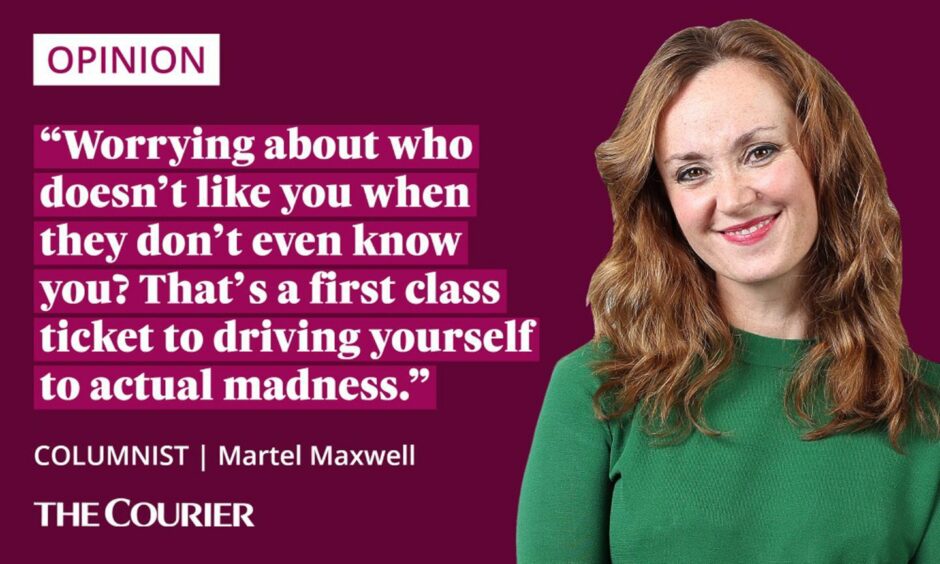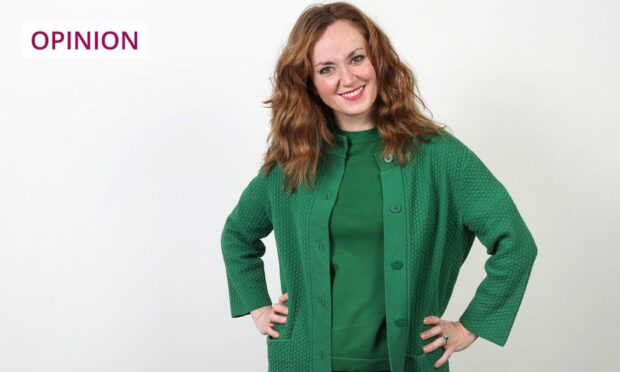A few years ago, my gran got into a taxi and the driver said: “Helen Maxwell?”
“That’s right,” she told him.
“No relation to that Martel Maxwell, I hope,” he said.
“I’m her gran,” she replied.
“Can’t stand her,” he told her.
My gran asked if he’d ever met me.
“Not really,” he said. But he did say that once, too many taxis had arrived at my house to collect pals from a party for my 40th birthday. I had apologised and given the drivers with no fares £10 for their wasted journeys.

I was reminded of this story the other day when chatting to two friends.
The conversation turned to whether we care what people think of us.
One said she couldn’t care less. She’s 60 now, and experience has taught her not to give a jot – unless it’s the opinion of friends and people she likes.
The other friend envied this attitude and said she cares what everyone thinks, and it’s exhausting.
I thought I was somewhere in the middle. But like the first friend, I’m learning some valuable lessons.
You can sense when someone doesn’t like you. Whether you’re in a shop, at a party or walking down the street.
I used to care. I’d try to win them round. Be funny, be nice.
But now I’ve realised I’ve got better things to do.
Why do people not like me? (And why should I care?)
It’s an interesting question: Do you care what people think of you?
And it’s bizarre to consider people form an opinion of you having never met you. But we do it all the time – especially with people on the telly.
“Sleekit, that’s the word, wouldn’t trust her as far as I could throw her.”
I remember someone saying this about a female presenter who I thought seemed nice. In fact, I know her and she’s lovely – and I said so.
And if you have a TV profile, the preconceptions are heightened. But it affects everyone to a degree.
There will be traffic wardens disliked purely for their job when they have a heart of gold.
There will be teachers ignored in the supermarket because they once said something a parent took the wrong way.
And there will be people who are whispered about because of a rumour that stuck that simply wasn’t true.
Caring is good. Otherwise we would all be walking about with stains on our clothes and putting in minimal input at work.
But I’ve also learned we should try to take on board the pearls of wisdom we trot out to the kids.
I’m still trying when it comes to “your best is always good enough”.
A valuable life lesson: Let gran have the last word
Back to the taxi driver though.
I’ve sat on that story for almost six years. When I first heard it I was incredulous and a bit hurt.
But it epitomises what I’m trying to say. Some people just won’t like you. Trying to change their minds is a waste of energy.
And worrying about who doesn’t like you when they don’t even know you? That’s a first class ticket to driving yourself to actual madness.
The life lesson for me? To focus on the people who do like you and waste no energy on the ones who don’t.
And I’ll end by telling you what my gran said to the driver who told her I’d given him £10.
“Count yourself lucky,” Helen Maxwell, soon to be 90, declared.
“I’d have given you **** all.”
Have a lovely day.















Conversation